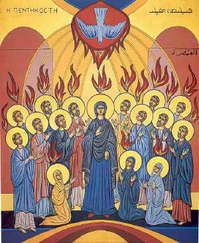Come, Holy Ghost, send down those beams,
which sweetly flow in silent streams
from Thy bright throne above.
O come, Thou Father of the poor;
O come, Thou source of all our store,
come, fill our hearts with love.
O Thou, of comforters the best,
O Thou, the soul’s delightful guest,
the pilgrim’s sweet relief.
Rest art Thou in our toil, most sweet
refreshment in the noonday heat;
and solace in our grief.
O blessed Light of life Thou art;
fill with Thy light the inmost heart
of those who hope in Thee.
Without Thy Godhead nothing can,
have any price or worth in man,
nothing can harmless be.
Lord, wash our sinful stains away,
refresh from heaven our barren clay,
our wounds and bruises heal.
To Thy sweet yoke our stiff necks bow,
warm with Thy fire our hearts of snow,
our wandering feet recall.
Grant to Thy faithful, dearest Lord,
whose only hope is Thy sure word,
the sevenfold gifts of grace.
Grant us in life Thy grace that we,
in peace may die and ever be,
in joy before Thy face. Amen. Alleluia.
This hymn, Veni, Sancte Spiritus, also known as the Golden
Sequence, is the poetic text (a sequence) for the Mass for Pentecost. It is
sung after the Epistle and before the Alleluia antiphon. It is regarded as one
of the greatest masterpieces of sacred Latin poetry. The hymn has been
attributed to three different authors, King Robert II-the Pious of France
(970-1031), Pope Innocent III (1161-1216), and Stephen Langton (d. 1228),
Archbishop of Canterbury. Archbishop Stephen is most likely the author. The
inclusion of this hymn in the sacred Liturgy is noted in the mid-12th century
or so and sung from Pentecost through the Octave. When the renewal of the
Liturgy happened following the Second Vatican Council the Octave of Pentecost
was suspended and the sequence limited to Pentecost Sunday.
